Meet the Scholars
Scholars
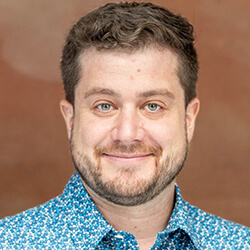 Ian Blumenthal, PhD
Ian Blumenthal, PhD
Price Lab
Ben Towne Center for Childhood Cancer and Blood Disorders Research, Seattle Children’s Research Institute
Olson Lab
Ben Towne Center for Childhood Cancer and Blood Disorders Research, Seattle Children's Research Institute
Ian Blumenthal, PhD, is a bioengineer, synthetic biologist and immunologist with a passion for advancing kids-first therapies toward the clinic. Blumenthal joined the laboratories of Dr. Jason Price and Dr. Jim Olson, where he designs targeted protein therapeutics that augment immune cells for the treatment of pediatric tumors with low mutational burdens. As an Invent Scholar, he aims to gain the skills and experience necessary to navigate the treacherous development and commercialization pathways for drugs to treat children and other patient populations.
He was selected as a 2025 Damon Runyon–St. Jude Pediatric Cancer Research Fellow. The prestigious four-year fellowship — Blumenthal is one of only six fellows chosen nationwide — comes with $300,000 in funding to support his research.
Blumenthal received two bachelor’s degrees in engineering from Dartmouth College, after which he trained at Mass General and the Broad Institute with Jim Gusella, PhD, and Mike Talkowski, PhD, in human neurodevelopment. He earned his PhD in bioengineering from the University of Washington, where he worked with Mike Jensen, MD, to develop a best-in-class drug regulation system for the modulation of chimeric antigen receptor (CAR) T cell activity after administration to patients.
Beyond research and therapeutics development, Blumenthal has a passion for all the outdoor adventures the Pacific Northwest has to offer. Instilled with the belief that there is no bad weather, just “weather,” you’ll find him outside between experiments in all seasons. When he’s not in lab or the mountains, he’s listening to music, cooking, gardening or enjoying a cup of coffee.
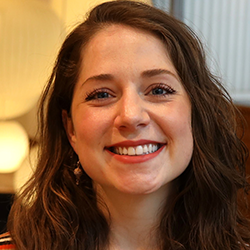 Natasha Bourgeois, PhD
Natasha Bourgeois, PhD
Aitchison Lab
Center for Global Infectious Disease, Seattle Children’s Research Institute
Natasha Bourgeois, PhD, is a microbiologist pursuing pediatric disease research and drug development. She is dedicated to a research career working with a team of passionate scientists to develop therapeutics that can cure pediatric infectious disease and cancer globally.
Bourgeois received a BS in biological sciences from the University of New Orleans and a PhD in pathobiology from the Department of Global Health at the University of Washington. She has contributed to numerous biomedical research fields, including identifying biomarkers of evolutionary adaptation in West African antelope, characterizing regulators of mitochondrial biogenesis in yeast, and investigating host cell regulators of salmonella, HIV, malaria, tuberculosis and dengue. Her graduate thesis research identified cellular factors with the potential to be therapeutically targeted to disrupt dengue infection in liver cells, where severe disease often manifests. Through the Invent@SC program, Bourgeois will expand her expertise in host-pathogen research to more translational work in infectious disease as well as cancer. With her lab mentor, Dr. John Aitchison, she is developing and testing nanobodies against viruses as well as glioblastoma. She is also continuing her education towards translational expertise with drug discovery, development and commercialization courses.
Bourgeois is passionate about scientific outreach, communication, and mentoring, and will always take the time to explain the science behind medicine to anyone – including her four cats and lizard who probably don’t understand her. She is working on releasing her podcast called, You’ve Got a Disease! With Dr. Bourgeois. When not working on science, Bourgeois enjoys cooking Cajun or Latin meals she picked up from her parents, baking excessively sugary sweets for her friends, coaching CrossFit or spending time outside paddleboarding, backpacking and skiing.
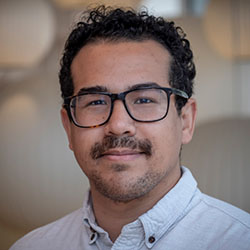 Stephen Carney, PhD
Stephen Carney, PhD
Evans Lab
Ben Towne Center for Childhood Cancer and Blood Disorders Research, Seattle Children’s Research Institute
Stephen V. Carney, PhD, is a geneticist trained in the areas of cancer biology, immunology, and epigenetics. His work focuses on developing novel therapeutic combinations to improve the survival of pediatric patients diagnosed with medulloblastoma, a brain tumor subtype that forms in the cerebellum. He will utilize patient derived xenografts and engineered mouse cell cultures to decode the tumor-specific vulnerabilities to novel drug inhibitors. He joined Dr. Myron Evans II Lab in May 2023 to gain experience on drug screening procedures and clinical trial design.
Carney completed two bachelor of science degrees in animal science and genomics and molecular genetics at Michigan State University. After graduating, he participated in the Postbaccalaureate Research Education Program (PREP) at Case Western Reserve University studying cortical developmental defects in a neurodegenerative disease called ataxia telangiectasia. This prompted his interest in neuroscience, and he later crossed research disciplines to study brain cancer. He conducted his graduate work in Dr. Maria Castro's laboratory at the University of Michigan, where he explored the reversibility of epigenomic reprogramming in isocitrate dehydrogenase 1 (IDH1) mutant glioma to decipher its impact on resistance to radiotherapy.
Carney has a mixed heritage of African American and Native American ancestry. His maternal grandmother’s tribe resides on Walpole Island Reservation as part of the Bkejwanong territory located on the Canada-Michigan border. Carney hopes to improve the representation of indigenous communities within the biotechnology space.
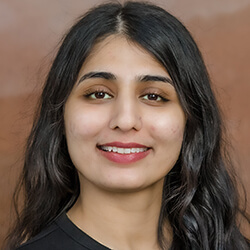 Saman Fatima, PhD
Saman Fatima, PhD
Bhardwaj Lab
University of Washington
Saman Fatima, PhD, is an Invent Scholar in the laboratory of Dr. Gaurav Bhardwaj. She received her PhD in inorganic chemistry from the University of Illinois, Urbana-Champaign (UIUC), under the mentorship of Dr. Lisa Olshansky, where her research focused on studying how structural dynamics influence metallocofactor activity in enzymes by designing conformationally switchable artificial metalloproteins (swArMs). Her thesis was recognized with the ACS Presidential P3 Medal for Graduate Research Excellence.
Originally from Pakistan, Fatima earned her BS in chemistry from LUMS University where she first developed an interest in molecular design. Over the years, she has cultivated a multidisciplinary research background spanning inorganic chemistry, biochemistry, spectroscopy and structural biology.
Driven by a long-standing passion for translational research, Fatima is focusing on incorporating computational tools into the design of proteins and peptides in her postdoctoral work with the goal of developing novel peptide-based therapeutics for pediatric diseases.
Beyond the lab, Fatima enjoys mentoring students and helping foster a supportive, engaging environment for young scientists. She has helped organize two scientific conferences and has also led STEM education initiatives in local elementary and middle schools. Curious about how discoveries make their way from the bench to the market, she explored the commercialization side of scientific innovation through an internship at the Office of Technology Management at UIUC and while working as a consultant at the Illinois Business Consulting Club.
In her free time, Fatima enjoys baking, going for runs and staying active at the gym.
 Shruti Gupta, PhD
Shruti Gupta, PhD
James Lab
Center for Immunity and Immunotherapies, Seattle Children’s Research Institute
Shruti Gupta, PhD, is a neuroimmunologist by training. She earned her MS in Neuroscience from Stony Brook University and holds a dual BTech/MTech degree in Biomedical Engineering from IIIT Allahabad in India. She completed her PhD in Neuroscience at The George Washington University, where her research focused on sex-specific immune modulation in multiple sclerosis using preclinical rodent models. Her doctoral work dissected the therapeutic potential of TNFR2 activation and revealed how sex-chromosome complement and cytokine profiles shape neuroinflammatory outcomes, leading to a first-author publication in PNAS.
As an Invent Scholar in the Dr. Richard James Lab, Dr. Gupta is investigating immune-based strategies to address diffuse midline glioma (DMG), a universally fatal pediatric brain tumor with limited treatment options and a poor prognosis. Her work is driven by the urgent need for therapies that can overcome the challenges of immune suppression and blood-brain barrier penetration. Leveraging her background in neuroimmunology, advanced mouse modeling, and translational immunotherapy, she is exploring the potential of engineered B cells as a treatment for DMG. Through this research, she aims to contribute to the development of next-generation immunotherapies that improve survival and quality of life for children with high-grade gliomas.
Dr. Gupta is a recipient of the Society for Neuroscience Trainee Professional Development Award and has presented her research at several international conferences. Beyond the lab, she has mentored undergraduate researchers and served as adjunct teaching faculty during her graduate training.
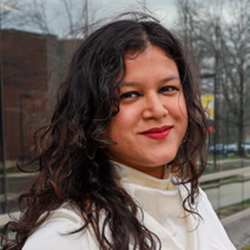 Aakanksha Jha, PhD
Aakanksha Jha, PhD
Beth Lawlor Lab
Ben Towne Center for Childhood Cancer and Blood Disorders Research, Seattle Children's Research Institute
Cole DeForest Lab
University of Washington
Aakanksha Jha, PhD, is a bioengineer and immunologist working towards developing models for Ewing Sarcoma, a deadly cancer in pediatric populations. Joining forces with Dr. Beth Lawlor at Seattle Children’s Research Institute and Dr. Cole DeForest at the University of Washington, Jha is working on engineering ex vivo models to better understand the pathophysiology of Ewing Sarcoma. The models may serve as a tool for clinical translation to impact the lives of the many children suffering from this malady.
After receiving a Bachelor of Engineering in Biomedical Engineering in 2018, Jha obtained a Master of Science degree from the University of Florida in 2020. During MS, she was exposed to research while working with Dr. Kyle Allen in exploring targets for osteoarthritis. Eager to gain more research experience, Jha pursued and obtained a PhD with Dr. Erika Moore in 2023. Her PhD work focused on investigating extracellular matrix ligands for their impact on modulating macrophage function. Jha’s work contributed to the gap in knowledge around macrophage immune cells and how their plasticity is heavily determined by the extracellular environment due to alterations in biochemical and biomechanical cues. This prompted a vested interest in immunology, ECM studies, and biomaterials design which led to a short Postdoctoral Researcher stint at the University of Maryland, College Park. Jha’s work has culminated in several publications, an international patent, presentations in conferences, and awards.
Jha is passionate about bridging the gap between benchtop to clinic through equity in science, translational research, and science communication. Jha has been recognized for her contributions in science as an international student by the Alec Courtelis International Student Achievement Award at the University of Florida. In her free time, Jha likes to swim, sing jazz and R&B, practice yoga, and dance salsa and bachata.
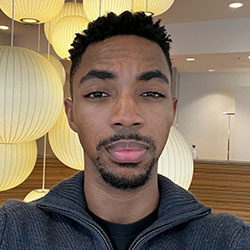 David Johnson, PhD
David Johnson, PhD
Disis Lab
University of Washington
David E. Johnson, PhD, is an Invent at Seattle Children’s Postdoctoral Scholar in Dr. Nora Disis's lab. His project is focused on developing and optimizing a vaccine for children with Familial adenomatous polyposis (FAP). Prior to Seattle Children’s, Johnson received his PhD from Cold Spring Harbor Laboratory School of Biological Sciences, where he studied how to use CRISPR based technology to elucidate and study novel therapeutics targets to treat glioblastoma.
In the future, Johnson hopes to establish his own lab and/or company whose research will be based in cancer biology with a therapeutic framework in mind. Johnson hopes to address the discrepancy in representation in science with a focus on the fact that many specimens used in daily research are limited in representation within the U.S. While being aware of the intricate relationship Black and brown communities have with science and research due to historical inequity, Johnson strongly believes that instead of scientific entities developing initiatives to collect data and specimen from black and brown communities, these same initiatives should, in parallel, also monetarily invest in building up communities that they are asking to help further their research. Through such an investment, Johnson hopes that Black and brown communities could feel a sense of support and genuine partnership and be more open to participating in providing specimens to these scientific-based entities. Ultimately, Johnson hopes that in the future, the research he and other scientific-based entities conduct will work towards incorporating tissue samples and clinical data from various racial groups that will inevitably strengthen their science whilst simultaneously giving back to the community that provides this data.
In another life, Johnson believes if science and research were not his calling, he would be diving into the arts and becoming a comedic writer/actor with a potential side gig as a DJ.
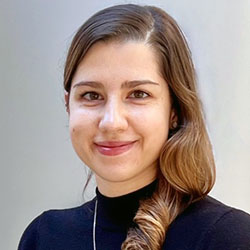 Hannah Kalinoski, PhD
Hannah Kalinoski, PhD
Oliver Harrison & John Ray
Benaroya Research Institute
Hannah Kalinoski, PhD, is an immunologist whose research focuses on designing novel therapies to treat pediatric autoimmune diseases. Her passion is to engineer targeted therapies to reduce detrimental side effects for pediatric patients. As an Invent at Seattle Children’s Postdoctoral Fellow, she joined the laboratories of Dr. Oliver Harrison and Dr. John Ray, where she researches genetic variants associated with autoimmune diseases to target pathogenic T cells mediating irritable bowel disease (IBD).
Kalinoski received bachelor’s degrees in microbiology and sociology from the University of Washington. As an undergraduate research assistant, she worked on designing novel influenza vaccines in the lab of Dr. Deborah Fuller. After graduating, she joined the lab of Dr. Michael Jensen at the Ben Towne Center for Childhood Cancer Research at Seattle Children’s Research Institute, where she worked as part of the preclinical team to develop and evaluate novel Chimeric Antigen Receptors (CARs). Kalinoski earned her PhD from the Johns Hopkins University Bloomberg School of Public Health, where she completed her graduate studies in the lab of Dr. Daniela Čiháková. In graduate school, Kalinoski’s research investigated cardiac resident memory T cells and their role in mediating ICI-myocarditis, an autoimmune disease caused by treatment with immune checkpoint blockade therapies.
Outside of science, Kalinoski has an immense sweet tooth and can be found on the weekends trying out local Seattle bakeries. She is a passionate baker who loves making laminated pastries such as croissants, turnovers or kouign-amanns.
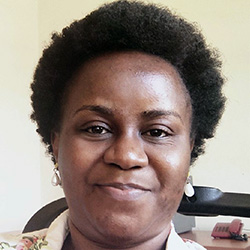 Bakyayita Rachel Kyeyune, PhD, MB ChB
Bakyayita Rachel Kyeyune, PhD, MB ChB
Otegbeye Lab
Fred Hutch Cancer Center
Bakyayita Rachel Kyeyune, PhD, MB ChB, has a background in clinical research spanning infectious and non-communicable diseases. She earned her PhD in International Health and Medical Research from Ludwig Maximillians University (LMU) in Munich, where her dissertation focused on hematological complications in people living with HIV initiating highly active antiretroviral therapy.
Prior to joining the INVENT@SC program, Kyeyune gained extensive experience in clinical trial regulation across Uganda and several African countries through her role as Manager of Clinical Trials at the National Drug Authority of Uganda. She has also served in key positions – including clinical trial coordinator, project manager and head of research program – at several of Uganda’s leading research institutions.
She began her postdoctoral training at the Fred Hutch Cancer Center, under the mentorship of Dr. Jennifer Adair, where she developed an optimized protocol for the efficient transduction of hematopoietic stem and progenitor cells (HSPCs) using novel hybrid lentiviral vectors, aimed at advancing the manufacturing processes for ex vivo gene therapy for hemoglobinopathies.
Currently, Kyeyune is working under the mentorship of Dr. Folashade Otegbeye at the Therapeutics Products Program (TPP) at Fred Hutch. Her current research is focused on using CRISPR technology with homology-directed repair (HDR) to knock in function-enabling receptors into natural killer (NK) cells prior to large scale expansion for off-the-shelf therapeutic use. She is also assessing the regulatory and technical requirements for platform technology designation of the identified manufacturing process, with the goal of de-risking and accelerating future applications of the technology for novel constructs using the same process..
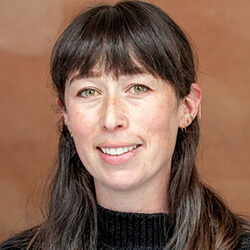 Miranda Lyons-Cohen, PhD
Miranda Lyons-Cohen, PhD
Oda Lab
Ben Towne Center for Childhood Cancer and Blood Disorders Research, Seattle Children’s Research Institute
Miranda Lyons-Cohen, PhD, is an immunologist focused on developing next-generation cell therapies to treat pediatric cancers. She received her PhD in immunology from the University of Washington where she investigated the mechanisms driving allergic responses in the skin under Dr. Michael Gerner. Prior to graduate school she worked as a post-baccalaureate fellow at the National Institute of Environmental Health Sciences in the lab of Dr. Donald Cook where she studied myeloid cell trafficking in response to inhaled allergens in the lung. She holds a bachelor’s degree from Reed College in Portland, Oregon.
Lyons-Cohen joined the lab of Dr. Shannon Oda to develop next generation therapies to treat pediatric CNS tumors. She will focus on the development of novel fusion proteins which enhance T cells’ ability to persist and function in the tumor microenvironment. Her work will contribute to advancing innovative, safe and effective cell therapies to improve treatment outcomes against solid tumors.
Outside of lab, Lyons-Cohen enjoys walking, hiking and swimming with her dog; watching and playing soccer; and looking for the next delicious restaurant to try in Seattle.
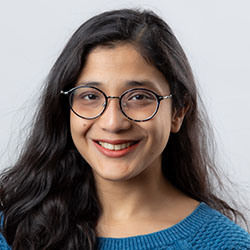 Haleema Sadia Malik, PhD
Haleema Sadia Malik, PhD
Adair Lab
Fred Hutch Cancer Center
Haleema Sadia Malik, PhD, earned her bachelor’s degree from Lahore University of Management Sciences (LUMS), where she conducted research in the Cancer Therapeutics Lab. Her undergraduate work led to the identification of a small molecule dual inhibitor targeting FLT3 and microtubule polymerization for Acute Myeloid Leukemia. She then pursued her doctorate at Dartmouth College under the guidance of Dr. James Bliska. Her dissertation focused on the regulation of the pyrin inflammasome, an innate immune sensor, within the context of host-microbe interactions and effector-triggered immunity. Her research highlighted the critical roles of phosphatase activity and microtubule interactions in the activation of the pyrin inflammasome.
Although her PhD research centered on understanding innate immune mechanisms, Malik has always been passionate about translational research. During her doctoral studies, she served as a part-time Biomedical Fellow at Celdara Medical, where she conducted scientific due diligence on potential pre-clinical biotech assets. This experience deepened her interest in translational research and motivated her to pursue a career in cell and gene therapy.
As an Invent Postdoctoral Scholar at Seattle Children’s, Malik us based at the Fred Hutch Cancer Center in the lab of Dr. Jennifer Adair. Her research involves developing gold nanoparticles for efficient delivery in primary T cells for CAR-T cell therapy and gene editing approaches. She aims for her work to contribute to making cell and gene therapies more accessible and affordable.
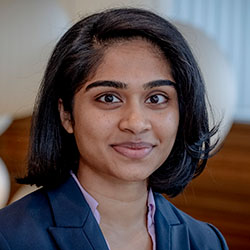 Sinduja Marx, PhD
Sinduja Marx, PhD
Olson Lab
Ben Towne Center for Childhood Cancer and Blood Disorders Research, Seattle Children’s Research Institute
Sinduja Marx, PhD, is a biological engineer with a passion for translational research in the development of therapeutics and diagnostics. As an Invent scholar, she is focused on developing curative therapeutics for children with eosinophilic esophagitis, a severe autoimmune disorder. To bring her research to fruition, Marx will be starting her postdoctoral training at the laboratory of Dr. Jim Olson and collaborating with the Cerosaletti and Ziegler Labs at the Benaroya Research Institute and the Kiem Lab at Fred Hutch.
Marx earned her BS in bioengineering with a specialization in biotechnology at the University of California, San Diego, where she joined research groups that developed nucleic-acid-based nanoscale bio-sensors. After graduating, she was a research associate at Illumina, working on the next generation of DNA sequencing technologies at the intersection of biochemistry, bioinformatics, electronics, and microfabrication. This inspired her graduate research, leading to her earning her MS and PhD in molecular engineering at the University of Washington, Seattle, where she specialized in computational protein design and single-molecule biophysics under the guidance of Professor David Baker and Professor Jens Gundlach in the Department of Biochemistry and the Department of Physics, respectively.
Marx's doctoral research used de novo protein design approaches with the Rosetta software suite to design novel membrane nanopores using engineering principles. This work contributed to the first de novo designed membrane beta-barrels and laid the foundation for computational design and characterization of nanopores for accurate DNA sequencing. During the COVID-19 pandemic, Marx's research centered on the enzyme nsp13, which is critical for SARS-CoV-2 virus replication. Using SPRNT, a nanopore technique developed in the laboratory of Dr. Jens Gundlach, she examined the mechanochemical motion of nucleic-acid processing enzymes with picometer resolution using nanopore data. This research advanced our understanding of nsp13 translocation and unwinding of nucleic acids, and also allowed for the measurement of nsp13 inhibition at single-nucleotide resolution.
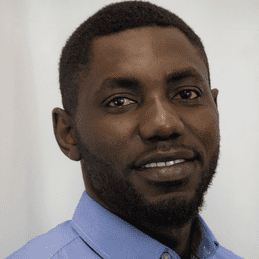 Jeffrey Amoako Mensah, PhD
Jeffrey Amoako Mensah, PhD
Kalume Lab
Norcliffe Foundation Center for Integrative Brain Research, Seattle Children’s Research Institute
Jeffrey Amoako Mensah, PhD, is an Invent Scholar in the laboratory of Dr. Franck Kalume. His research interests focus on investigating the molecular and genetic basis of childhood neurological diseases, identifying molecular and pharmacological targets and discovering efficacious therapeutic agents for treating neurodevelopmental disorders.
Mensah completed his graduate work at the University of Utah in the lab of Dr. Karen Wilcox. His PhD research contributed to establishing a preclinical drug screening approach for Dravet syndrome, which has been incorporated into the workflow of the National Institute of Neurological Disorders and Stroke-Epilepsy Therapy Screening Program contract site at the University of Utah. His work in the screening program became crucial as it contributed to the achievement of developing a genetic model of pediatric epilepsy to help identify novel therapies for this critical patient population.
He enjoys collaborating with several academic and community organizations to make science more accessible to the broader public.
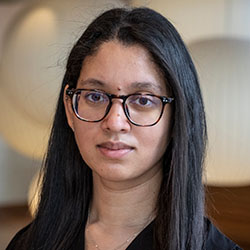 Neelakshi Mungra, PhD
Neelakshi Mungra, PhD
Jackson Lab
Center for Immunity and Immunotherapies, Seattle Children’s Research Institute
In her research, Neelakshi Mungra, PhD, focuses on the engineering of affordable cutting-edge antibody technologies that can be used in the depletion of specific B-cell subpopulations that are involved in life-threatening autoimmune disorders such as systemic lupus erythematosus (SLE).
Prior to joining Dr. Shaun Jackson's lab, Mungra completed her postgraduate work at the Medical Biotechnology and Immunotherapy Research Unit (MB&I) at the University of Cape Town in South Africa, where she specialized in the development of modular antibody technologies aimed at facilitating precision medicine in oncology by differential diagnosis and immunotherapy. With a better understanding of the disease-specific cell surface profiles of patient biopsies, the field of targeted drug development can be expedited and tailored according to surface marker-specific patient groups best responding to specific immunotherapy or precision medicine. This is especially apparent in the management of a daunting disease like breast cancer.
Mungra was recognized for her outstanding academic performance and contribution to society by the Research Excellence Award for Next Generation Researchers at the 2021 award ceremony of the National Research Foundation (NRF) of South Africa.
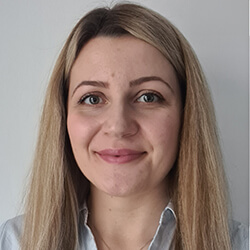 Emina Muratspahić, PhD
Emina Muratspahić, PhD
Ratner Lab
University of Washington
Bhardwaj Lab
University of Washington
Emina Muratspahić, PhD, is a chemical engineer with expertise in materials and polymer chemistry. Muratspahić is developing precision-porous biodegradable vascular grafts for infants with congenital heart disease under the mentorship of Dr. Buddy Ratner. She will also explore potential non-vascular applications of the biomaterials platform, such as pediatric cartilage repair and drug delivery for brain tumors. Co-mentored by Dr. Gaurav Bhardwaj, she will use computational tools to enhance the material properties and to develop protein-based therapeutics.
Muratspahić completed her bachelor's and master's studies in chemical engineering at the University of Sarajevo, Bosnia and Herzegovina. She graduated from the University of Vienna in 2023 with a PhD in material chemistry. As a PhD student in Professor Alexander Bismarck’s group, Muratspahić synthesized amphiphilic co-polymers for use as drag reducing and foaming agents, and emulsifiers. Upon completion of her PhD, she worked as a postdoctoral research fellow at the University of Vienna with Professor Robert Woodward on pH-responsive nanoparticles and porous materials for carbon capture and storage. Muratspahić’s work has so far appeared in journals including the Journal of Non-Newtonian Fluid Mechanics.
Apart from science, Muratspahić is passionate about connecting with people, whether it is spending quality time with friends and family or meeting new people. She enjoys learning about different cultures, believing that social activities enrich both happiness and well-being. She is staying physically active through yoga, hiking, tennis; loves reading; and is eager to learn piano. Muratspahić considers science and art to be deeply intertwined through creativity and curiosity.
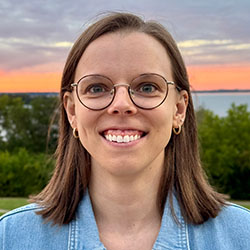 Kelsey Nemec, PhD
Kelsey Nemec, PhD
Vitanza Lab
Ben Towne Center for Childhood Cancer and Blood Disorders Research, Seattle Children’s Research Institute
Kelsey Nemec, PhD, is an Invent@SC Postdoctoral Scholar in the lab of Dr. Nicholas Vitanza at Seattle Children’s Research Institute. Nemec is a neuroimmunologist who is passionate about engineering novel, cell-based therapies to treat pediatric brain diseases. She is currently focusing her efforts on developing therapeutics to target diffuse intrinsic pontine glioma (DIPG), an aggressive and universally fatal pediatric brain cancer.
Prior to joining the Vitanza Lab, Nemec earned her bachelor’s degrees in Neurobiology and Psychology from the University of Wisconsin-Madison and her PhD in Neuroscience from the University of Pennsylvania. Under the mentorship of Dr. Chris Bennett, her PhD thesis focused on developing new ways to engineer microglia to study and treat brain diseases. Specifically, Nemec developed a novel model of microglia replacement that allows for rapid assessment of gene-targeted perturbations on microglial identity and function, which she used to elucidate the contribution of brain macrophages to Aicardi-Goutières Syndrome, a rare but progressive pediatric interferonopathy.
Outside of the lab, Nemec enjoys all things outdoors – hiking, camping, rock climbing, skiing and playing tennis. As a Wisconsin native, she is also a fan of good cheese, good beers and good sports; she never misses a Green Bay Packers gameday!
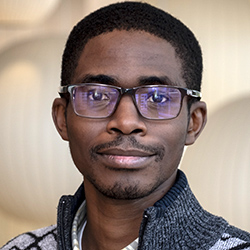 Akinsola Oyelakin, PhD
Akinsola Oyelakin, PhD
Ramirez Lab
Norcliffe Foundation Center for Integrative Brain Research, Seattle Children's Research Institute
Olson Lab
Ben Towne Center for Childhood Cancer and Blood Disorders Research, Seattle Children’s Research Institute
Akinsola Oyelakin, PhD, is a biochemist trained in cancer biology and bioinformatics. He is a postdoctoral researcher in the laboratories of Dr. Nino Ramirez and Dr. Jim Olson and will be developing novel therapeutic biomolecules for the treatment and prevention of schizophrenia. His research will build on his background in biochemistry and bioinformatics to engineer novel protein constructs that could also be adapted for a wide range of therapeutic applications.
Oyelakin obtained his BSc degree in biochemistry at Babcock University in Nigeria and completed his graduate training at the University of Buffalo in New York. His graduate work identified a role for the ETS transcription factor EHF in the regulation of cellular redox homeostasis in head and neck squamous cell carcinomas. In addition to his work in cancer research, his other research endeavors have contributed to our understanding of the gene expression programs governing salivary gland development and dysfunction.
Oyelakin is enthusiastic about translational science, and he hopes that his research as an Invent scholar will improve the lives of people diagnosed with schizophrenia.
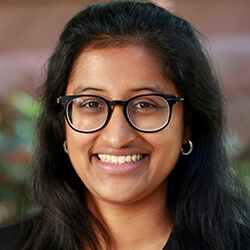 Harini Sadeeshkumar, PhD
Harini Sadeeshkumar, PhD
Sarthy Lab
Ben Towne Center for Childhood Cancer and Blood Disorders Research, Seattle Children’s Research Institute
Harini Sadeeshkumar, PhD, is an Invent Scholar in the laboratory of Dr. Jay Sarthy, where she performs preclinical research on alternative chemotherapy drugs to better treat pediatric acute myeloid leukemia (AML) patients. She is passionate about advancing therapeutic avenues that will directly impact patient outcomes and reduce toxic side effects.
Sadeeshkumar received her BS in bioengineering from the University of California, Berkeley, and her PhD in the Department of Molecular, Cellular and Developmental Biology at Yale University. Her graduate research in Dr. Ron Breaker’s lab focused on the discovery and applications of non-coding gene regulatory RNAs called riboswitches. Following her doctorate, she was passionate about applying her background in RNA biology towards the development of novel therapeutics and worked as a scientist at an RNA therapeutics biotech startup in Cambridge, Massachusetts. In her current role she intends to expand her expertise in nucleic acid biology to include cancer epigenetics and apply her past biotech experience towards translating her research to the clinic.
Outside of the lab, Sadeeshkumar enjoys immersing herself in nature on long hikes, skiing, tennis, reading novels and cooking with friends.
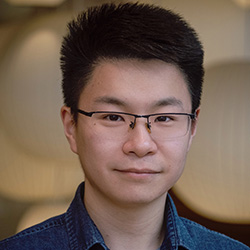 Edward Song, PhD
Edward Song, PhD
Vitanza Lab
Ben Towne Center for Childhood Cancer and Blood Disorders Research, Seattle Children’s Research Institute
Edward Song, PhD, earned a BS in biological sciences from the University of Pittsburgh and a PhD in cell and molecular biology with a focus area of gene therapy and vaccines at the University of Pennsylvania. Under the mentorship of Drs. Michael Milone, Daniel Powell and Carl June at Penn Medicine, Song’s PhD project developed a combination therapy of CAR T cells with IAP antagonists to address the issue of tumor antigen heterogeneity for glioblastoma, which has been presented orally and on poster at ASGCT and ISCT conferences and published in Molecular Therapy – Oncolytics. Song’s first official day in grad school happened to be the day when the U.S. FDA officially approved Kymriah, the first gene therapy/CAR T-cell therapy approved in the U.S., which inspired Song to work on CAR T-cell research at Penn for his PhD study.
Song joined the Invent at Seattle Children’s Postdoctoral Scholar Program in January 2023 and is focusing on CAR T-cell therapy research for pediatric CNS tumors in Dr. Nicholas Vitanza’s lab at the Ben Towne Center for Childhood Cancer and Blood Disorders Research, Seattle Children’s Research Institute. Song is passionate about doing translational research to develop novel cellular immunotherapies from bench to bedside and is interested in commercializing new biotechnologies.
On a personal note, Song’s hometown is Beijing, China, and he is passionate about helping international students and scholars to overcome language and cultural barriers for studying and working in the U.S. In his free time, Song is a huge fan of watching live sports, with some of his favorite teams including Bayern Munich, Union, Sounders, Mavericks, 76ers, Storm, Steelers, Eagles (Go Birds!) and Seahawks – the last of which he discovered is not an actual bird through Google. Song also loves taking road trips in the U.S. and has driven across the country three times.
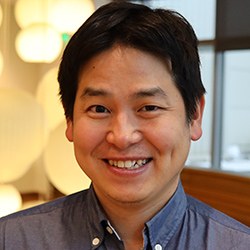 Yusuke Suita, PhD
Yusuke Suita, PhD
Olson Lab
Ben Towne Center for Childhood Cancer and Blood Disorders Research, Seattle Children’s Research Institute
Yusuke Suita, PhD, is a cancer biologist with an entrepreneurial spirit. He received his PhD in molecular pharmacology and physiology from Brown University. Under the guidance of Drs. Nikos Tapinos, Jie Shen, Ritambhara Singh and Mamiko Yajima, he developed a groundbreaking cancer cellular trap for glioblastoma, alongside the construction of machine-learning models predicting gene expression in glioblastoma cells using multiple epigenetic markers.
In the Invent@SC program, Suita is developing a new local immunotherapy for pediatric brain tumors using the combination of protein-based immunotherapy and hydrogel along with computational design under the guidance of Drs. Jim Olson and Cole DeForest. An experience within his own family sparked his personal motivation to embark on this path; contrary to the initial prognosis of one month, he witnessed his grandfather's life remarkably extended by two years, owing to an innovative treatment that halted tumor progression. His grandmother’s profound gratitude catalyzed his determination to create novel therapies for currently underserved cancer types. His overarching goal is to engineer a transformative therapy that elevates cure rates for young patients, fostering a society where cancer is not a source of fear but a manageable condition.
While at Brown, Suita was elected to the New England Medical Innovation Center Med Tech program, where his research pitch received recognition from potential investors. Looking ahead in the Invent@SC program, he aspires to present both his vision and the treatment prototype to investors – ultimately bringing the treatment from bench to bedside, with the support of his clinical and biotech mentors.
When Suita is not in the lab or chatting about science with others, he can be found savoring delicious foods, cheering for the Japan national soccer team, or enjoying the thrill of skiing down slopes.
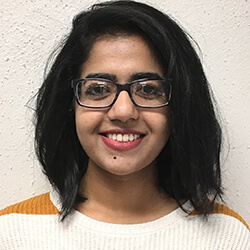 Riya Reachal Thomas, PhD
Riya Reachal Thomas, PhD
Aldinger Lab
Norcliffe Foundation Center for Integrative Brain Research, Seattle Children’s Research Institute
Riya Thomas, PhD, is a neuroscientist specializing in radiation oncology, neuro-oncology, and molecular neuroscience. She is currently conducting research under Dr. Kimberly Aldinger, focusing on advancing therapeutics for gene-associated developmental epilepsy disorders in children as part of the Invent Program. Her overarching goal is to improve the health outcomes of vulnerable patient populations through innovative treatments.
Thomas earned her BS in biology from Evangel University, Missouri, and subsequently pursued a master’s degree in cell and molecular biology at Missouri State University and Washington University in St. Louis. Her master's research, conducted under Dr. Benjamin Timson and Dr. Carla Yuede, investigated the effects of physical activity on neurodegenerative diseases.
She has held positions at the University of Illinois at Chicago and Baylor College of Medicine, where she explored cerebrovascular dysfunction in Alzheimer’s disease and gene mutations in myotonic dystrophy type II, respectively. Thomas completed her PhD at the University of Texas MD Anderson Cancer Center, focusing on the effects of photon and particle radiation on microtubule-associated proteins in normal brain tissue and glioblastoma patients. Her research also delved into elucidating cell death pathways in radiation therapy.
Beyond her academic pursuits, Thomas enjoys reading and writing fantasy and science fiction stories, stargazing and sketching.
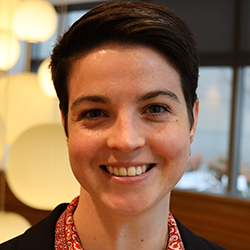 Elzani van Zyl, PhD
Elzani van Zyl, PhD
Kaushansky Lab
Center for Global Infectious Disease Research, Seattle Children’s Research Institute
Elizabeth (Elzani) M. van Zyl, PhD, is an Invent at Seattle Children’s Postdoctoral Scholar in Dr. Alexis Kaushansky’s lab. Her work is focused on therapeutic development to treat relapsing forms of Plasmodium vivax malarial infections. P. vivax dormant forms are extremely difficult to target, and most currently available drugs do not address malaria relapse. Through this research, she aims to gain drug development and drug screening experience.
Van Zyl has an educational background in biomedical engineering, having earned her bachelor of science, master of engineering and doctoral degrees from Worcester Polytechnic Institute (WPI) in Massachusetts. Her career trajectory was profoundly influenced by the high incidence of burn injuries in her homeland of South Africa. It was this concern that drove her to embark on her doctoral research, which focused on improving the functionality of bacterial-derived cellulose materials - more commonly known as kombucha SCOBYs - for wound dressing applications. Van Zyl's work included the development of novel methods for producing optically transparent bacterial cellulose materials to facilitate wound site visualization and the design of bifunctional antimicrobial peptides to provide surface antibacterial activity, thereby combating and preventing wound site infections.
Van Zyl’s passions outside of the lab include bringing awareness to invisible disabilities, rock climbing, skiing, and exploring all of Washington state’s beautiful bodies of water with her water-obsessed dog.
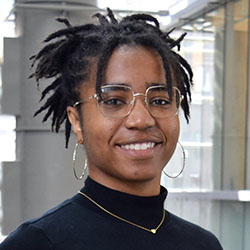 Kierra Ware, PhD
Kierra Ware, PhD
Page Lab
Norcliffe Foundation Center for Integrative Brain Research, Seattle Children’s Research Institute
Kierra Ware, PhD, earned her bachelor’s degree from Tennessee State University in Biochemistry. She conducted research at Meharry Medical college on triple negative breast cancer and castration resistant prostate cancer. After graduating, she continued her passion for science at the University of Cincinnati where she received her PhD in the Molecular Genetics, Biochemistry, and Microbiology program. Her dissertation focused on the role of Transforming Growth Factor Beta signaling in adult neurogenesis, giving her a background in neurodegenerative diseases and regenerative medicine.
Ware is now a postdoctoral researcher in Dr. Damon Page’s lab in the Norcliffe Foundation Center for Integrative Brain Research at Seattle Children’s. Her work focuses on growth and connectivity in the developing brain.
In her spare time, Ware enjoys bouldering, kickboxing, videogames, and rooting for the Detroit Lions to make it to the Super Bowl one day.
Affiliate Members
Affiliate members are postdoctoral scholars employed by Seattle Children’s who are working on “Discovered Here” therapeutics.
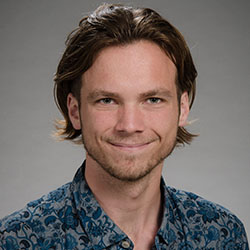 Kurt Berckmueller, PhD
Kurt Berckmueller, PhD
Torbett Lab
Center for Immunity and Immunotherapies, Seattle Children’s Research Institute
Kurt Berckmueller, PhD, is a virologist designing high throughput methods to develop novel gene therapy platforms. He received his PhD in pathology from the University of Washington where he worked in the lab of Dr. Hans-Peter Kiem at the Fred Hutchinson Cancer Center on developing cell targeting techniques. Prior to this he worked in the lab of Dr. Jay Berzofsky at the National Cancer Institute on correlates of immune cell exhaustion in the context of HIV infection.
Berckmueller joined Dr. Bruce Torbett’s lab to tackle the question of how to rationally design gene therapy vectors. He is developing high throughput methodologies including library designs and evolutionary systems to try and better understand the fitness topology of vectors for various gene therapy applications. The hope from this research is to develop vectors that could function in vivo, enabling their application to low-resource settings around the globe and enhancing access to these life changing therapies.
In his spare time, Berckmueller enjoys wandering around glaciers and other high altitude locales, reading on economics and science fiction, playing Dungeons and Dragons, and tending to his bonsai trees and shrimp.
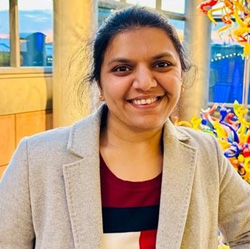 Aditi Deshpande, PhD
Aditi Deshpande, PhD
Parish Lab
Center for Global Infectious Disease Research, Seattle Children’s Research Institute
Aditi Deshpande, PhD, is a trained microbiologist with special interests in antimicrobial resistance and drug discovery. Bacterial physiology and the way they can adapt to their environment fascinates her. Her current research project focuses on studying novel small molecules which target respiration in Mycobacterium tuberculosis. She aims to better understand the mode of action of these chemical molecules under different physiological conditions and how they can be introduced into the treatment regimen for tuberculosis.
Before joining the Parish Lab, Deshpande completed her PhD in biomedical sciences at Texas A&M University at College Station under the guidance of Dr. Julian Hurdle. She has worked on antibacterial resistance of the anaerobe Clostridioides difficile and has studied the intersection of iron metabolism in drug resistance and virulence of the pathogen.
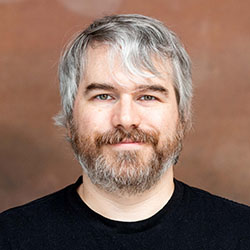 Ragan Pitner, PhD
Ragan Pitner, PhD
Rawlings Lab
Center for Immunity and Immunotherapies, Seattle Children’s Research Institute
Ragan Pitner, PhD, is an immunologist and immune engineer aiming to develop novel cell therapies to treat autoimmune disease in children. He earned his PhD in immunology from the University of Washington under the mentorship of Dr. David Rawlings, developing a B cell engineering approach to blunt the generation of antibody-derived drug inhibitors. Prior to his doctoral studies he worked as a biochemist in preclinical research and development at PAI Life Sciences in Seattle. Before relocating to Seattle, he earned a master’s degree in biomedical engineering by designing orthogonal cell signaling platforms in Dr. Joshua Leonard’s synthetic biology lab at Northwestern University.
Pitner chose to remain in the Rawlings Lab as an Invent Affiliate, where he intends to leverage the lab’s expertise in gene editing B cells to further develop the “decoy” platform he developed under Dr. Rawlings and Dr. Richard James. His work will focus on augmenting decoy B cells with regulatory cargo to drive antigen-specific tolerance and treat autoimmune diseases. He hopes that such therapies, given to children, might prevent the lifelong pain and permanent physical damage he has seen his mother suffer in her battle with systemic lupus erythematosus and rheumatoid arthritis.
He is passionate not only about the research that drives cutting edge cell therapies, but also about equitably translating them into the clinic. When he’s not thinking about work, he loves to attend metal concerts, hike, or watch way too much Memphis Grizzlies basketball.
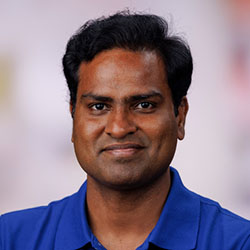 Sivasankaran M. Ponnan, PhD
Sivasankaran M. Ponnan, PhD
Jackson Lab
Center for Immunity and Immunotherapies, Seattle Children’s Research Institute
Sivasankaran M. Ponnan, PhD, is a clinical microbiology specialist trained in infectious disease, immunology and vaccinology. Ponnan earned his PhD from the Indian Council of Medical Research (ICMR) in India. There, he researched to understand the mucosal and systemic immune response in HIV-exposed seronegative (HESN) individuals. He was awarded a young scientist fellowship by the Department of Health Research (Governmentt of India) to pursue his graduate studies. He is a curious scientist interested in immunotherapy, autoimmune diseases, and immune cell function, particularly in B and T cells. He has extensive expertise in cutting-edge single-cell profiling, including 47-parameter high-dimensional flow cytometry, multicolour cell sorting, and spectral cytometry.
Ponnan joined the Shaun Jackson Lab in June 2023 to gain experience in autoimmunity and immunotherapies. At Seattle Children's Research Institute, his research aims to improve our understanding of the immune pathogenesis of human autoimmune diseases, particularly the role of B cells and T cells in systemic lupus erythematosus (SLE). His current project focuses on a comprehensive approach to investigate the role of B and T cell phenotypes in anti-CD19 CAR-T effector immunotherapy, how these cells maintain immune tolerance, and the efficacy and specificity toward complete remission of SLE. Ponnan firmly believes that a deeper understanding of the basic biology of cellular mechanisms underlying autoimmune disorders will facilitate the identification of cellular biomarkers that can be used to target immune therapies to achieve complete remission of the disease.
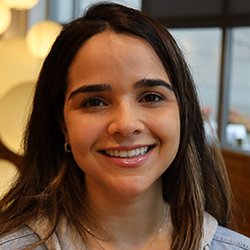 Fernanda Rodrigues da Costa, PhD
Fernanda Rodrigues da Costa, PhD
Parish Lab
Center for Global Infectious Disease Research, Seattle Children’s Research Institute
Fernanda Rodrigues da Costa, PhD, is a microbiologist trained in areas of antibiotic discovery, biochemical and biophysical characterization of proteins involved in cell wall formation in bacteria and characterization of bacterial resistance mechanisms and pathogenesis. She is a postdoctoral fellow in Dr. Tanya Parish’s lab at the Seattle Children’s Research Institute, where she has been working on tuberculosis biology and drug discovery. Her research project aims at identifying tuberculosis drug candidates with a novel mode of action focusing on understanding their mechanism of action, mode of kill, resistance mechanisms, and drug target identification and validation.
Prior to joining the Parish lab, Rodrigues da Costa completed her doctorate studies at Brazillian National Laboratory (LNBIO)/Universidade Estadual de Campinas, where her main project involved the identification of new antibiotics in libraries of natural products. During that period, she also had the opportunity to participate in an exchange program and do a scientific internship at the Institut de Biologie Structurale in France, where she worked on a project concentrated on the study of proteins that form a complex involved in cell wall formation in bacteria. During her master's studies, she was trained in a clinical microbiology laboratory, where the focus of her research was the characterization of bacterial resistance mechanisms, mainly in those pathogens considered priority by World Health Organization (WHO).
Rodrigues da Costa has been working on bacteriology field for the past eleven years and has become passionate about research on new antibiotics and bacterial pathogenesis.
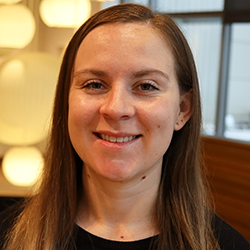 Emma Wrenn, PhD
Emma Wrenn, PhD
Lawlor Lab
Ben Towne Center for Childhood Cancer and Blood Disorders Research, Seattle Children’s Research Institute
Emma Wrenn, PhD, is a postdoctoral researcher in Dr. Beth Lawlor’s lab in the Ben Towne Center for Childhood Cancer and Blood Disorders Research. Her current research focuses on the relationship between epigenetic plasticity, the tumor microenvironment, and metastasis in Ewing sarcoma.
She received her PhD from the University of Washington’s Molecular and Cellular Biology Graduate Program. Wrenn conducted her dissertation research at the Fred Hutch Cancer Center in Dr. Kevin Cheung’s lab, studying how cell-cell interactions promote metastasis in breast cancer partly through the formation of intercellular reservoirs of signaling molecules in nanolumina.
Her postdoctoral work is specifically focused on identifying new therapeutic strategies for metastatic or relapsed Ewing sarcomas, which have very poor survival rates. Ewing sarcomas are driven by fusions of EWS and ETS transcription factors, most commonly EWS::FLI1. While they are typically driven by a single oncogene, Ewing sarcomas display a surprising amount of intra- and inter-tumoral heterogeneity. Wrenn is working on understanding the biological basis of this heterogeneity, and how it contributes to disease progression and resistance to treatment. Her work in the Lawlor Lab has helped identify a subset of mesenchymal and extracellular matrix-associated genes which subpopulations of tumor cells express that promote tumor aggression. Her current work focuses on identifying key upstream regulators of this cell state plasticity that can be targeted to reduce metastatic progression, and on developing therapeutic strategies to destroy the pro-metastatic microenvironment generated by these tumors.
Alumni
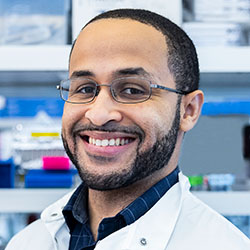 Eric Nealy, PhD
Eric Nealy, PhD
Eric Scott Nealy, PhD, was an Invent@SC affiliate member and postdoctoral scholar in Dr. Jim Olson’s lab in the Ben Towne Center for Childhood Cancer and Blood Disorders Research. During his time at Seattle Children's, Nealy’s research centered around treating children with brain tumors by teaching their immune system to identify and eliminate any remnant cancer cells. He is currently a patent agent at Wilson Sonsini Goodrich & Rosati.
